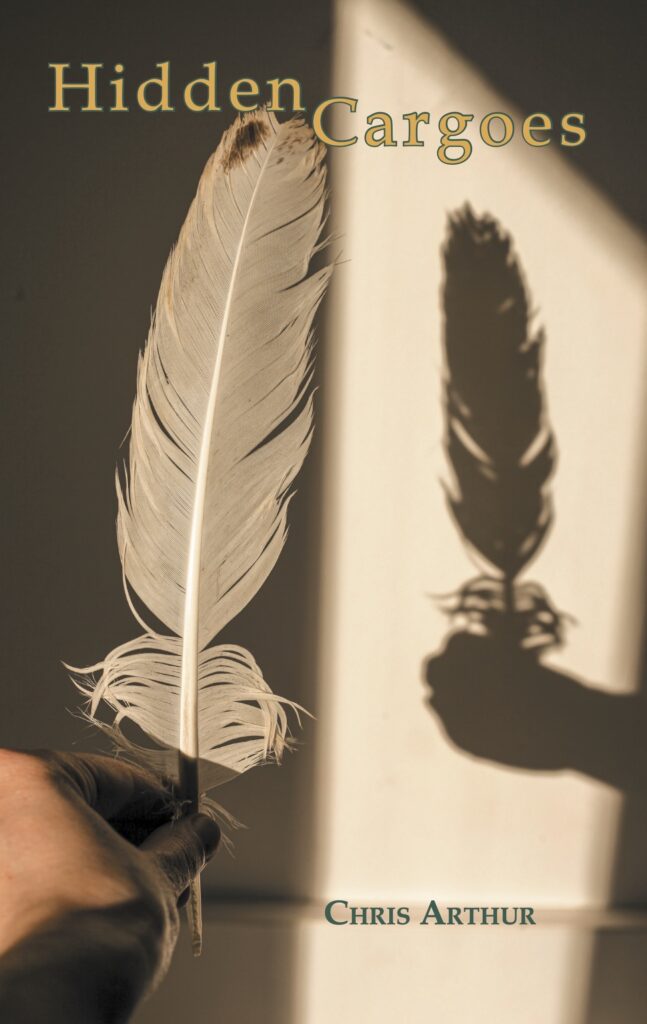Book Review by Dymphna Lonergan
Hidden Cargoes by Chris Arthur
Eastover Press 2022
ISBN 978-1—958094-03-7
RRP: $31.50

A review by Dymphna Lonergan
Chris Arthur’s Hidden Cargoes begins with a challenge to the reader who might scoff at William Blake’s claim that ‘world can be seen in a grain of sand/And a heaven in a wild flower’ (p.11). The worlds Arthur offers for contemplation in his book of essays include an owl’s skull, a woman’ ear, a cigar box contents, a fallen leaf, Scrabble, and a bird’s egg.
Published during the pandemic, Hidden Cargoes reflects that time when we were compelled to slow down, to step off the everyday world, and to see what had been hidden from the busyness of daily life and new wonders: the free run of a kangaroo down bare city streets, rows of grounded Qantas planes on a Detroit tarmac. It was a time to find beauty and joy in the most ordinary of things, silly dancing on TikTok, Italian neighbours singing out from high-rise balconies, the slowly expanding hand clapping for essential workers. From our own closed windows, we noticed wonder in a shaft of sunlight on a leaf or the swoop of a bird out in that then-forbidden world.
Chris Arthur’s essays take us out from our new normal now to consider the wonder that is still around us and always has been. The thing itself, an owl’s skull, a fallen leaf, is a wonder, but what contemplation on this wonder does for Arthur leads to ‘a chain of associations’ (p. 67), discourses upon discourses. An ordinary walk in a ‘favourite haunt’ (p. 206) is suddenly changed by a natural but ultimately horrifying event, leaving him ‘enthralled and appalled’, ‘rivetted’ and ‘even disgusted’(p. 209). His favourite haunt is now haunted by the memory of what he witnessed. He leads us through his inner struggle to accept the ugliness and horror of everyday natural life, finally reaching an understanding of his own mortality and what will be ‘the little drama’ of his own passing. (p. 217)
Arthur has a poet’s lyricism throughout his chain of associations that sometimes struggles under its weight. The fallen ‘Leaf’ that takes us from an Antrim castle to the sound of Latin names descends to the various uses for timber. The ‘Ear Piece’ that brings to mind initially ‘The Girl with the Pearl Earring’ is buffeted by modern connotations in a male contemplating an Australian girl’s ear on a bus in Scotland. This essay introduces a questioning device of a concerned brother looking for context that may reflect the writer’s own unease at a possible response in the reader. The unease, of course, could be simply this particular reader’s. The essay ‘Ear Piece’ might work better as a poem.
Hidden Cargoes with its associations, contemplations, and insights brings everyday life to new considerations. Arthur offers a fallen leaf as being like a ‘kind of tuning fork’ (p. 71); we appreciate the beauty in the perfect fit of a plant in the back of a car (p.73); Nature’s cycle is an ‘annual mortality play’ (p. 83). The pandemic leads to a revival of Scrabble in his personal life. The lost tile becomes a source of wonder, and research finds that it is one of about a million Scrabble tiles ‘lost in the world-somewhere’ (p. 103). It’s difficult not to see the entire collection as an exercise in bringing home those lost tiles that can extend our interest in the game of life and add to our understanding with new words.
Hidden Cargoes is a substantive work of research and creative analysis that also reads like a gentle musing on life by a favourite relative. In his Acknowledgements, Chris Arthur notes that ‘writing claims time in abundance’ (p. 227). He has taken the abundant time needed to write these essays and to launch them into the new normal world. Hidden Cargoes needs time for its full appreciation, the kind of time we once had when the world stopped and we saw Blake’s ‘eternity in an hour’.
Dymphna is a member of Tinteán’s editorial collective